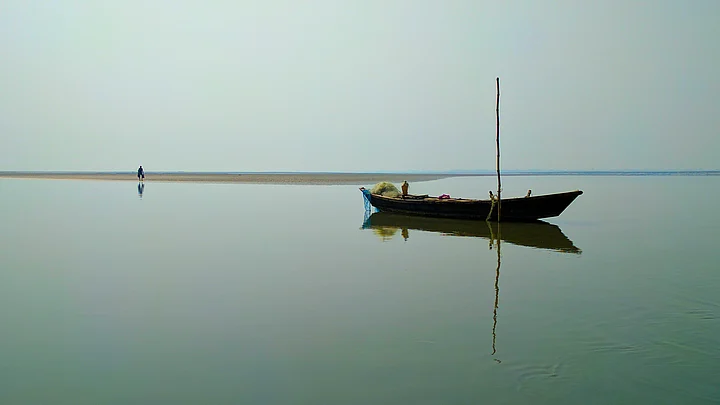“Why should I vote, when nobody even comes to ask for it?”
Faujdaar, a farmer in his late fifties, asks with a face of familiar dejection. He has grown accustomed to this feeling perhaps. And the sentiment is largely uniform in his village, Pachisa, a settlement of 350 families, approximately 80 kilometres from Uttar Pradesh’s Sitapur district. The village is surrounded by two rivers – Sharda, and Ghaghra.
The topography of this village makes it almost invisible, even to the local administration.
The village is accessible through a boat ride only. We drove for almost 2 hours from Sitapur, and then a slight detour from the pucca road, followed by another half an hour’s drive, and then 20 minutes walk to reach the boat boarding point.
And often, the river can be seen inside the boat too. “The base is a little damaged, hence the water seeps in,” says Puti Ram calmly.
“It takes almost an hour to cross the river on this boat. Across the river, I have almost four acres of of masoor farms,” says Suresh while rowing the boat through shallow water. He has one of the 11 odd boats in his village of 350 families.
360 view: The Quint’s Aaqib Raza Khan and Neeraj Gupta on the boat to Pachisa.
“What problems do you face personally, in this village?”
“Saegar hain. Kaisan batayi? (There are many. How should I tell?)”
“May I know your name, please”
“In our village, we don’t tell the name of women”
Faujdaar sits in his thatched hut. “Why should I vote for anyone, when nobody even comes here to ask me for my vote?,” he rues.
“Does this torch work?”
“Naahi bhaiyya. Ee kharab para hai (No brother. This is out of order),” informs Faujdaar.
“I have 6 sons, 3 daughters, 3 daughter-in-laws, 4 grandsons, and 1 husband. We had a boat too, but it was damaged after the last floods. It was a source of our livelihood,” says Chhutku, as she adjusts her sari for the photograph.
“I will vote for anyone who can get us a little more elevated place to stay. I am constantly worried about my kids’ whereabouts. I am afraid they may drown by accident. It gets even worse during the rainy season,” pleads Gulab Rani, aged 35, flanked by her kids (right to left) Raj Karan, 2, Soni, 6, and Ankit, 12.
The kids don’t go to school, because the school is on the other side of the river, and there’s no safe way to commute.
A 360 degree view inside Ram Parsaad’s hut in Pachisa village.
“I’m happy,” exclaims Ram Parsaad, while having lunch after a long day of fishing. “Thoda mushkil hai, par kaat lete hain (It’s a little difficult, but we manage somehow,” says Parsaad with a calm smile.
“I am enrolled as a voter, but I don’t have my voter card. When I reach the polling booth to cast my vote, I am given a slip by the person who takes us there. Sometimes political parties take us there,” Parsaad says.
The village has no electricity and people manage by small jugaads, such as this rechargeable battery pack. “We use small solar panels to recharge the batteries,” Parsaad tells.
“You have a mobile phone too?,” I ask Ram Parsaad.
“Arey, you’ll find more mobile phones in this village than people,” Parsaad grins.
Elections have come and gone, but Pachisa remains unconnected, and the lives are constantly at risk with the rivers. It may take more than a mere political will to turn the fate around of this secret village of the stream.
Will 2017’s Uttar Pradesh Elections manage to bridge the gap? Comment with your views. Also share this with your friends, and help spread the word.
(At The Quint, we question everything. Play an active role in shaping our journalism by becoming a member today.)
